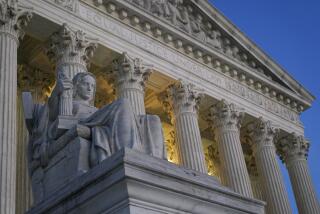The lesson behind the Chief Justice Roberts rumor
Reporting from New York — NBC anchor Brian Williams’ train was just pulling into Washington’s Union Station on Thursday afternoon when he read an urgent bulletin on his BlackBerry: U.S. Chief Justice John G. Roberts Jr. was contemplating stepping down, according to a report on RadarOnline.
“It struck me as odd,” Williams said. “What I know about Radar does not include their Supreme Court reporting.”
Still, the possibility that President Obama would have to fill another opening on the bench put Williams, a Supreme Court buff, into breaking-news mode. The anchor jumped out of his seat and ran through the station, eager to get to NBC’s Washington bureau. “I thought I was going to have to get on camera,” he said.
Just a minute later, NBC News justice correspondent Pete Williams e-mailed the anchor that sources at the court had knocked down the story “in the most vehemently conceivable way,” Williams said.
But the tale behind the rumor, which ricocheted through legal circles, turned out to be almost as intriguing: It apparently originated in a first-year law class at Georgetown University as part of a professor’s lecture about the importance of verifying the credibility of legal informants.
Lesson duly noted.
That an exercise in a criminal justice class threatened to morph into a national story underscores the lightning-fast nature of the new media age and the perils of this generation’s self-publishing instincts.
“It is a good reminder of the value of old-fashioned reporting, whether that comes in print or online -- just someone exercising a certain amount of news judgment,” said David Lat, managing editor of the legal blog Above the Law, which first identified Georgetown law professor Peter Tague as the unwitting source of the story.
When the Radar story broke Thursday, Lat said he was immediately flooded with e-mails from readers and friends asking him whether it was true. “It was the kind of thing where I sort of rolled my eyes because it didn’t seem credible at all,” said Lat, who closely follows the judiciary. The idea that Radar -- which mainly traffics in celebrity fare -- would be ahead of the legal press on such a big story seemed implausible.
“On the other hand, part of me did think, ‘If they’re writing about something so out of their expertise, do they have something solid?’ ” Lat added.
“The National Enquirer was right about John Edwards.”
Radar, in fact, is owned by American Media Inc., the parent company of the National Enquirer. David Perel, managing editor of Radar, did not return messages seeking comment.
The Above the Law editors placed calls to the public information office of the Supreme Court as well as other sources, which reacted to the report with incredulity. Within the hour, Radar posted an update walking back the story, though not fully retracting it.
“Despite considering resigning from the U.S. Supreme Court, Chief Justice John Roberts will stay on the bench, RadarOnline.com has exclusively learned,” the website wrote.
But Lat is skeptical that Radar’s story was anything more than a rumor gone awry. His first clue came midafternoon Thursday, when he heard from students at Georgetown University Law Center that Tague had opened his 9 a.m. criminal justice class by saying that Roberts was stepping down from the bench.
Tague, a veteran professor who specializes in criminal procedure and professional responsibility, had apparently floated similar stories in other classes over the years to illustrate the importance of challenging seemingly credible sources about their information.
But this time, the news quickly flew beyond the walls of the classroom. “Since everyone is so wired these days, the students were IMing and G-chatting and e-mailing friends and family, and in the span of somewhere between 30 minutes and an hour, the rumor spread like wildfire,” Lat said.
Midway through the class, Tague told his students that he had made up the story, but it was too late -- the information was out and couldn’t be recalled. Around 12:30 p.m. Eastern time, Radar posted its story, which quickly got picked up by the Drudge Report and the Huffington Post.
“He made his point beautifully,” Lat said of the law professor. “It’s a lesson for the Information Age.”
A spokeswoman for Roberts said the chief justice had no comment. Tague did not respond to messages left at his office and with Georgetown University’s communications office.
Williams said he hopes the take-away from the episode is the value of “brand-name reporting.”
“People, I hope, understand that there’s confidence required in our line of work,” he said.
Times staff writer David G. Savage contributed to this report.
More to Read
Sign up for Essential California
The most important California stories and recommendations in your inbox every morning.
You may occasionally receive promotional content from the Los Angeles Times.










